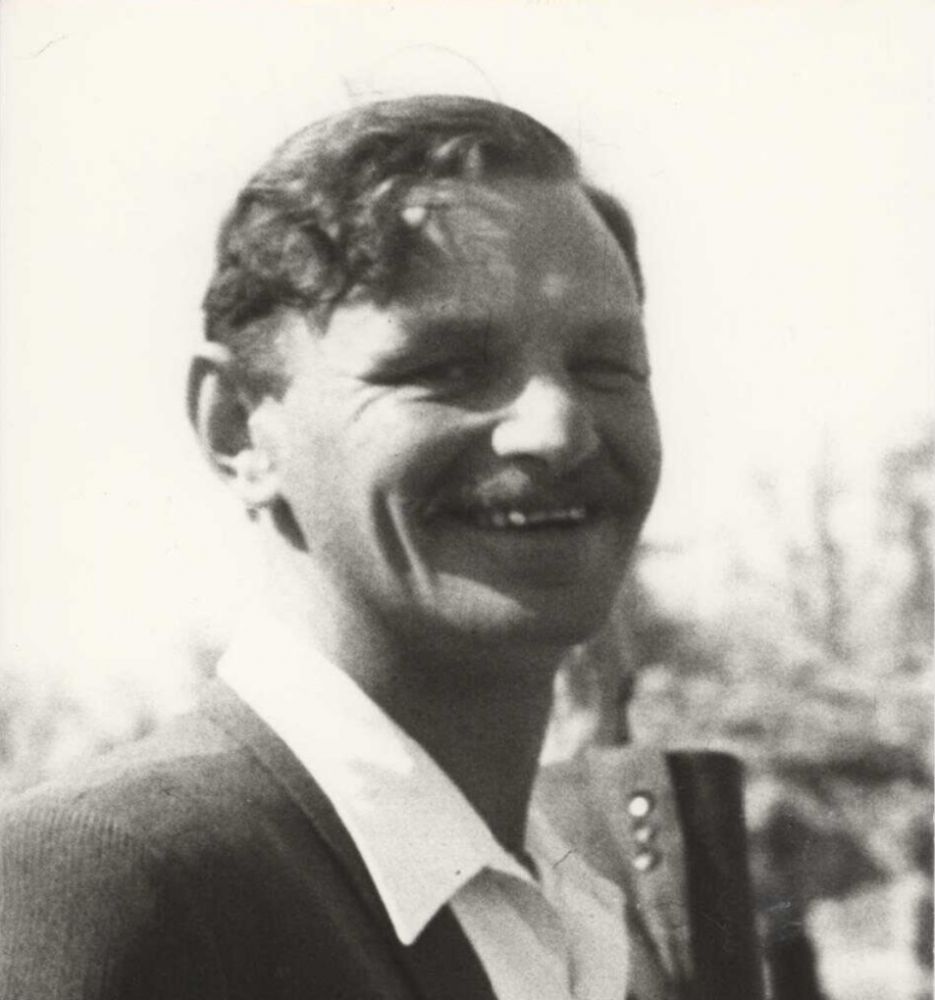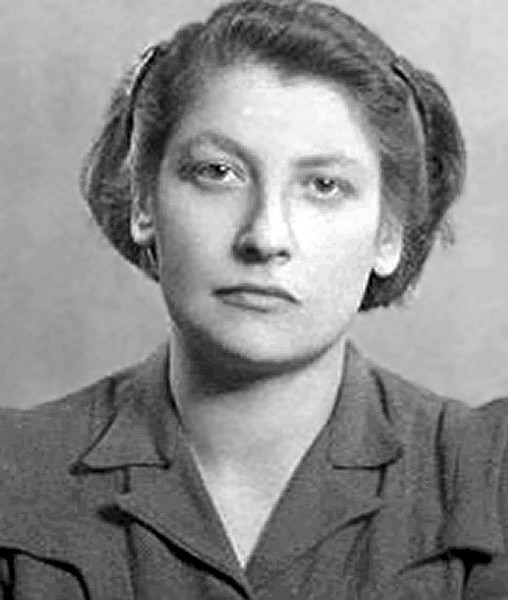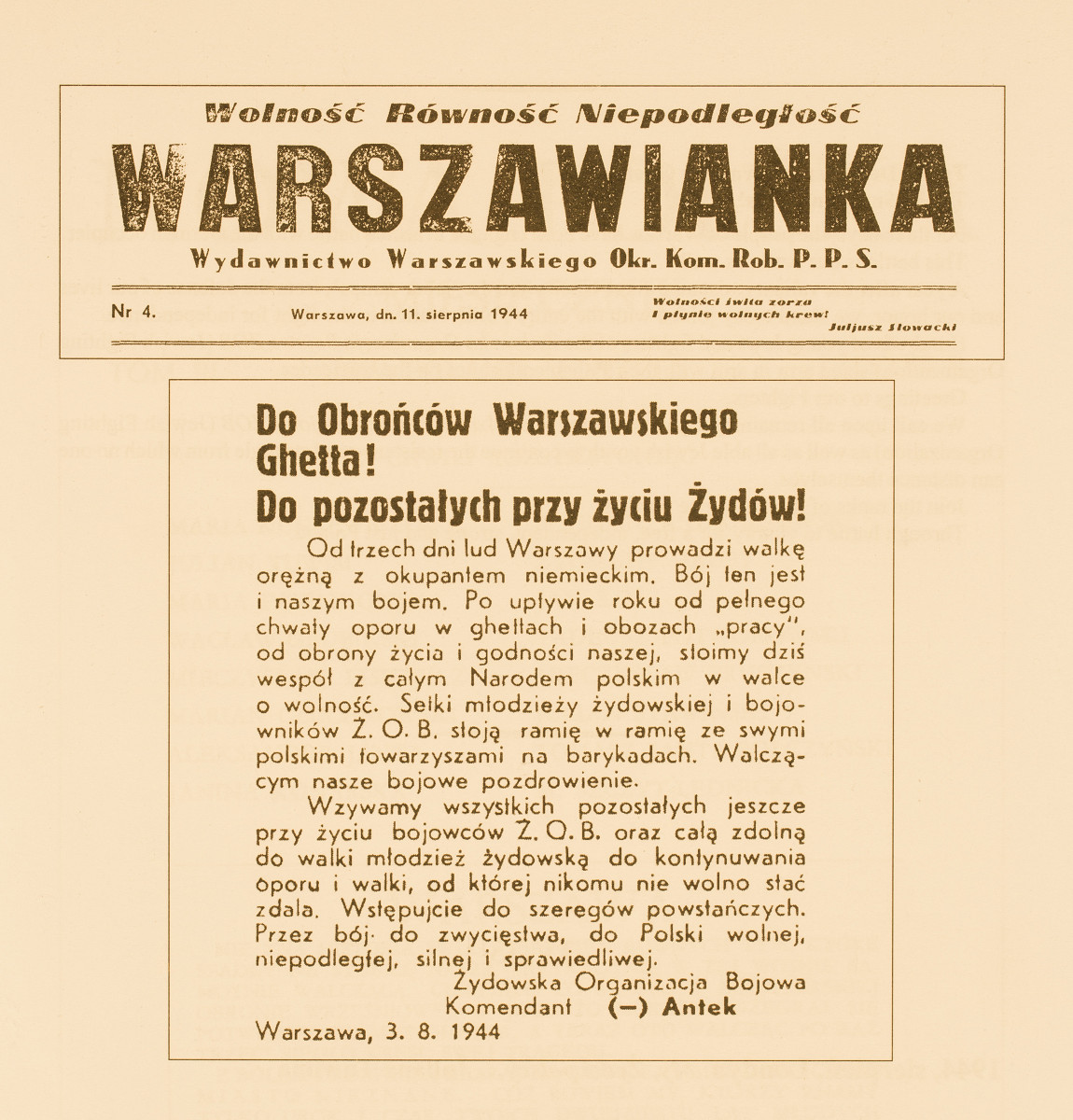- News
- Events
- Oneg Shabbat
- Collections
- Research
- Exhibitions
- Education
- Publishing Department
- Genealogy
- About the Institute
- Bookstore


Yitzhak Zuckerman, photo by Julia Pirotte, 1948. JHI collection, Central Judaic Library
He was a romantic kind of person — Marek Edelman writes about Yitzhak Zuckerman (Icchak Cukerman) — He wrote letters to his friends in concentration camps. He had to smuggle some secret information in them, but apart from that, they were letters full of romanticism, flowers, love. The girls were crazy about him. He was really handsome. He had exceptional sense of beauty. He would rather talk about people than what was happening at the moment. He loved to laugh. He would tell jokes from far, borderland provinces. They were silly, but somehow they made us laugh. He liked people. He felt uncomfortable only when he had to shoot. In his view, shooting was a sad necessity, not something good.
In many moments of the life of Icchak Cukierman „Antek”, this necessity turned into everyday life. Cukierman was a co-founder and the deputy commander of the Jewish Fighting Organization (ŻOB) (Mordechai Anielewicz was the commander). About a dozen months after the suppression of the uprising in the ghetto, he led the Jewish unit fighting in the Warsaw Uprising. However, „Antek” was more of an organiser of underground social life than a soldier. He was also one of the most effective.
He was born on 13th December, 1915 in Vilnius. After having graduated from high school, he was admitted to university. However, he did not take up studies, but instead joined a kibbutz and set up his own Halutz community. He had been a member of a Zionist movement He-Halutz ha-Cair (Hebrew for a Young Pioneer) since he was little. In 1936, by order of the leaders of the movement, he came to Warsaw, joined a commune and took up work on a farm in Grochów. Two years later, he was already a general secretary of combined organization Dror-He-Halutz. When the war began, he was in Volyn, where he was organizing seminars for future Jewish pioneers in Palestine.
He came back to Warsaw after having illegally crossed the border of the General Government, in April 1940. He started creating smuggling networks for the Jews to take them from Poland to Palestine. When, after the outbreak of the German-Soviet war, it was no longer possible, he continued training pioneers in the ghetto; he organized regular schooling and contributed to the creation of the conspiratorial press. In July 1942, after the beginning of the great liquidation action by the Germans, resulting in about 300 thousand Jews being taken to the gas chambers in Treblinka, the previous shape of the underground work was no longer possible. Social life in the deserted ghetto was replaced with preparations for armed resistance.

On 13th April, 1943. A week before the outbreak of the uprising, Cukierman left the ghetto in order to substitute for arrested-by-the-Germans Arie Wilner, the liaison between ŻOB and the Polish underground. The outbreak of the uprising took everyone aback. It must have been especially difficult for Cukierman to look at the fighting ghetto and think about his friends, among whom was his wife Cywia Lubetkin „Celina”. He could not go back to the ghetto, though. His task was to stay in touch with AK and AL, supply weapon for the fighting and prepare escapes and hiding places for those who would survive.
On 1st August, 1944 another uprising broke out in Warsaw. One of the units fighting within the Armia Ludowa [People’s Army] was an independent platoon of ŻOB, including „Celina”, Marek Edelman and Symcha Ratajzer „Kazik”. „Antek” Cukierman was the commander. It was his appeal that was published in the underground press. He wrote:
For three days, the people of Warsaw have been engaged in armed fighting with the German occupier. [...] Hundreds of Jewish adolescents and ŻOB fighters are standing shoulder to shoulder with Polish comrades manning the barricades. Our regards to the fighting. [...] Join the insurgents. Through pain to victory, to free, independent, strong and just Poland.

After the liberation of Warsaw, „Antek” and „Celina” lived together with other Halutzim in the so-called Kibbutz in Poznańska (58 Poznańska Street). They got involved with rebuilding the Zionist movement; both of them were also members of the Presidium of the Central Committee of the Jews in Poland, which coordinated aid given to the survivors of the Holocaust and represented them before the authorities. Simultaneously, Cukierman and his wife took part in preparations for illegal and then half-legal emigration of the Jews from Poland to Palestine. Throughout Brich (Hebrew for escape), lasting for three years after the war, 140 thousand Jews left Poland. The majority of them had survived the war on the territory of the USSR.
On July 4, 1946, Cukierman took part in a meeting with Prime Minister Edward Osóbka-Morawski. At one point the premiere was called to the phone. When he returned, he informed the participants that a pogrom had taken place in Kielce. „Antek” was the first to reach Kielce from Warsaw, bringing with him two trucks of medicines and other necessary means.
I went to the streets of Kielce — Cukierman recalled — But the city was like a ghost town. I asked to be led to the morgue. I saw dozens of bodies. And new corpses of Jews murdered on the roads were still being brought. I saw pregnant women with rips open. I am not able to describe what I saw. And yet it was not 1942. It was 1946!
During the Pogrom, 37 Jews were killed. The wounded and those who wanted to leave Kielce, fearing for their own lives, were transported to Krakow by the Red Cross train (for safety reasons the train was escorted by the army). Icchak Cukierman watched over the successful course of the entire undertaking.
„Celina” and „Antek” went to Palestine six months after the Kielce pogrom. They were the co-founders of the Kibbutz Ghetto Fighters and Gett Geters Museum — one of the most important institutions commemorating the Holocaust in the world. Cywia Lubetkin died in 1978 and Icchak Cukierman died on 17 June 1981.
The quotes in the text were taken from:
R. Assuntino, W. Goldkorn, Strażnik. Marek Edelman opowiada, Cracow, 2006.
I. Cukierman „Antek”, Nadmiar pamięci (siedem owych lat). Wspomnienia 1939–1946, scholarly editing and preface M. Turski, afterword W. Bartoszewski, Warsaw.